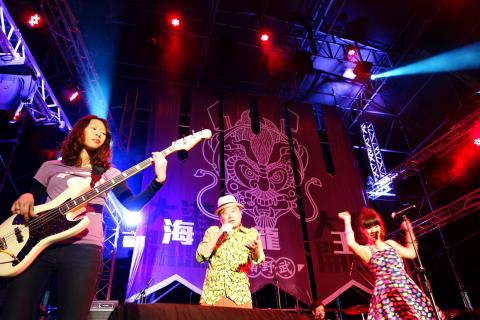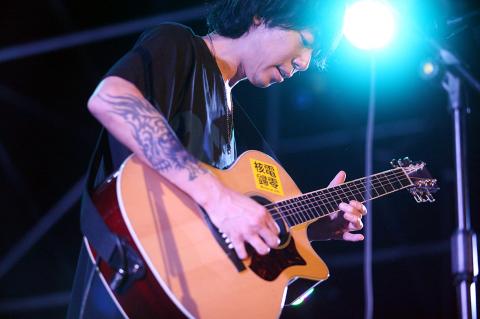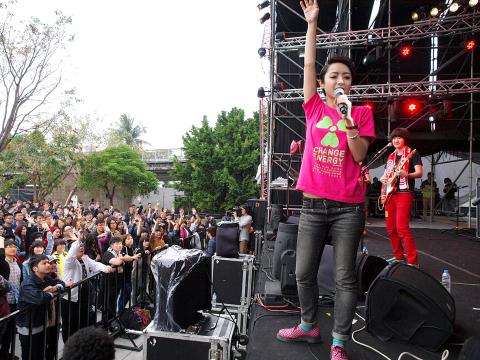Mega Port (大港開唱) has grown up into a real music festival. When it took place last weekend in Kaohsiung, it drew around 20,000 fans over two days to see more than 80 bands on five major stages. When it was founded in 2006, it was mostly a curiosity, an offshoot franchise of the Formoz Festival (野台開唱) for the straggling and dispersed rock fans down south.
In the last two years, it has reached a tipping point, having grown large enough in terms of both attendance and media attention that things just began happening organically. “It was really unexpected, but this year suddenly lots of people began approaching us with ideas, so we were able to add all these new areas,” said Orbis Fu (傅鉛文), CEO of the Mega Port’s parent company, The Wall Music.
As a result, the NGO Village area was bigger than ever. There was an on-site hair salon. There were two new DJ stages, a skateboard area, live graffiti, and an art project of around a hundred lifesize wire figures covered in white plastic — strewn throughout the 2km site, they ruffled in the wind and looked like people in cheap plastic raincoats. Before the fest, there was lots of grumbling about a pop star, Cyndi Wang (王心凌), in this rock fest lineup. Named one of the top ten most popular entertainment celebrities of 2011 by Next Magazine, Wang is a typical product of the Mandopop entertainment-publicity complex. But she at least appeared to embrace the idea of musician-generated music, performing a song with the band Punk Hoo (胖虎) and declaring she hoped to form her own band.

Photo courtesy of The Wall
Anti-nuclear sentiment was ubiquitous. In addition to the stickers, t-shirts and shuffling environmentalist proselytizers, a slew of musicians took up the cause. Bobby Chen (陳昇) exhorted a big, main stage crowd, “Don’t be against nuclear power, get rid of it all together.” Wonfu (旺福), Dog G (大支) and Fire EX (滅火器) also bandied around the cause.
Hotels around the Pier 2 Arts District — at least the cheaper ones — were booked to capacity with rockers from Taipei City. In short, there was drama, a national audience and a great subcultural sampling — all the tiny nuances that add up to a great festival vibe, both on and off the site.
So in a sense, it didn’t matter that the international headliners were sometimes less than inspiring. Grizzly Bear was great for fans of Grizzly Bear, but hardly captivating. The Japanese experimental metal band Boris played a set that was dazed, creepy and extremely loud, but also hard to latch on to. Many said their performance a night before in Taipei was much better. Japanese punkers 10 Feet were, however, rousing, intense and fun.

Photo courtesy of The Wall
Many of the biggest crowds of the festival turned out for local acts. The Sunday night finale by Fire EX saw several thousand flock to the main stage. Veteran rocker/comedian Bobby Chen and the band 1976 were also major draws. Fans had to squeeze in to see Elephant Gym on one of the smaller stages, and deathcore group Side Effect demonstrated a solid following.
If anything, Mega Port seems poised to grow. In the Pier 2 Arts District, an expansive and renovated industrial zone of warehouses and harbor works, is a 10-minute cab ride from the heart of the city, has plenty of space and is relatively insulated from noise complaints. The March weather in Kaohsiung is temperate, dry and — unlike every summer festival in Taiwan — wholly immune from typhoons. One can also surmise that Mega Port has a decent measure of government support. Look for it to be just as good if not better next year.
This weekend in Taipei, the beat goes on with a couple of fun indie shows. A small recording studio in Banciao called Rooftop Audio has over the last couple years recorded some of the most interesting indie acts in Taiwan, including Forests, Sleaze, Hang in the Air and Green! Eyes. Recently, it invited 11 bands to come in and record a single track, and it is releasing the results this weekend as a compilation CD, The Sound of the Rooftop. There will also be a two-day showcase at The Wall with all eleven bands playing.

Photo courtesy of The Wall
Bands include American Muffins (美國大麻煩), Bowztiger (包子虎), Forests (森林合唱樂團), Fruciente (佛香甜 ), Moonteg, Queen Suitcase (皇后皮箱), Sleaze (湯湯水水), The Tic Tac and Windmill (風籟坊).
■ The gigs are tomorrow and Sunday, 8pm to 11pm at the Wall, B1, 200, Roosevelt Rd, Sec 4, Taipei City. Tickets are NT$700 for both days in advance, or NT$500 per day at the door.
Japanese act Killie will play tonight at the invitation of the local label PsychoYouth Records, which specializes in punk, hardcore, emo and screamo. If you like the Japanese group Envy, or the Taiwanese band Human Beings (人), this will be your bag. There will be lots of heavy distortion, top-of-the-lungs venting and a bunch of dudes doing a slow mosh. Support bands include Sleaze, Until Seeing Whales Eyes, Karma Collective and Mr. Dirty.
■ Today at 7:50pm at Pipe Livehouse, 1 Siyuan St, Taipei City (台北市思源街一號). Tickets are NT$400 at the door.

The 1990s were a turbulent time for the Chinese Nationalist Party’s (KMT) patronage factions. For a look at how they formed, check out the March 2 “Deep Dives.” In the boom years of the 1980s and 1990s the factions amassed fortunes from corruption, access to the levers of local government and prime access to property. They also moved into industries like construction and the gravel business, devastating river ecosystems while the governments they controlled looked the other way. By this period, the factions had largely carved out geographical feifdoms in the local jurisdictions the national KMT restrained them to. For example,

April 14 to April 20 In March 1947, Sising Katadrepan urged the government to drop the “high mountain people” (高山族) designation for Indigenous Taiwanese and refer to them as “Taiwan people” (台灣族). He considered the term derogatory, arguing that it made them sound like animals. The Taiwan Provincial Government agreed to stop using the term, stating that Indigenous Taiwanese suffered all sorts of discrimination and oppression under the Japanese and were forced to live in the mountains as outsiders to society. Now, under the new regime, they would be seen as equals, thus they should be henceforth

With over 100 works on display, this is Louise Bourgeois’ first solo show in Taiwan. Visitors are invited to traverse her world of love and hate, vengeance and acceptance, trauma and reconciliation. Dominating the entrance, the nine-foot-tall Crouching Spider (2003) greets visitors. The creature looms behind the glass facade, symbolic protector and gatekeeper to the intimate journey ahead. Bourgeois, best known for her giant spider sculptures, is one of the most influential artist of the twentieth century. Blending vulnerability and defiance through themes of sexuality, trauma and identity, her work reshaped the landscape of contemporary art with fearless honesty. “People are influenced by

The remains of this Japanese-era trail designed to protect the camphor industry make for a scenic day-hike, a fascinating overnight hike or a challenging multi-day adventure Maolin District (茂林) in Kaohsiung is well known for beautiful roadside scenery, waterfalls, the annual butterfly migration and indigenous culture. A lesser known but worthwhile destination here lies along the very top of the valley: the Liugui Security Path (六龜警備道). This relic of the Japanese era once isolated the Maolin valley from the outside world but now serves to draw tourists in. The path originally ran for about 50km, but not all of this trail is still easily walkable. The nicest section for a simple day hike is the heavily trafficked southern section above Maolin and Wanshan (萬山) villages. Remains of